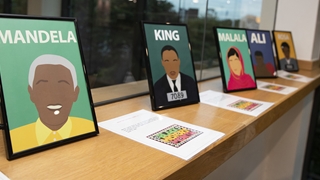
I am very pleased to have been asked to contribute to and close this series on the importance of Black History Month.
The perspectives of the previous contributors have been insightful and, in many ways, resonate with me on a personal level.
A childhood trip to the Caribbean island of Jamaica (my ancestral home) added personal context to the importance of Black history for me.
This idyllic setting still contains the hallmarks of a lasting engagement with the British Empire. Rudimentary questions, such as why the counties all have English names (Cornwall, Middlesex and Surrey), or how I came to have such a typical European surname myself, raised emotive feelings around concepts of identity and “Britishness” from an early age.
Having spent time learning about the stories of my own forbearers, the statement “I am my ancestors' wildest dreams” really does resonate on a personal level.
I’m very proud to represent a living memorial of their enduring strength over adversity; I owe my very existence to it.
History has always been a passion of mine, however the lack of Black history reflected within the school curriculum meant that, even as a Black British child, I had to proactively seek to educate myself about myself.
This educational blind-spot still exists today, depriving people of all cultures and backgrounds of an important learning opportunity which risks being filled by ignorance.
For me, BHM represents an oasis of knowledge and insight for those of us who may have previously missed out.
To Remmie’s point made earlier in this series, BHM can be a circuit-breaker to move beyond the narrative of slavery as the sum of Black history, something which is particularly important for younger generations.
Personally, I have been touched to learn about fascinating figures such as Walter Tull, the nation’s first Black professional outfield player, and his bravery during the First World War.
As such, BHM can be a means of preserving and elevating little-known, but vital stories from the far and recent past to positively inspire future generations.
Role models help to shape our view of what is possible. Therefore, it is also important to give visibility to today’s history makers.
In the context of football, this also includes senior leaders in business and administration away from the pitch - the creation of the Football Leadership Diversity Code offers a real opportunity for progress to be made in this area.
Fundamentally, history is not static or owned by any particular group of people. It is something that is made every day and which we are all a part of.
As Edleen eloquently put it, this year we can and should shine a light on our shared British history but in its authentic context.
Building on this theme, Huai-Ginn gave us his thought-provoking take on how BHM has inspired him to consider the role he can play in creating positive change, as well as representing his authentic self – something I think we can all learn from.
While the month itself provides a moment for reflection, it is important that we all draw on the daily opportunities that present themselves to learn, listen and share in order to help create a well-informed and inclusive society.
So don’t let this month coming to an end stop you from learning something new – if you haven’t had a chance to read the previous articles in the series, that would be a great place to start.









